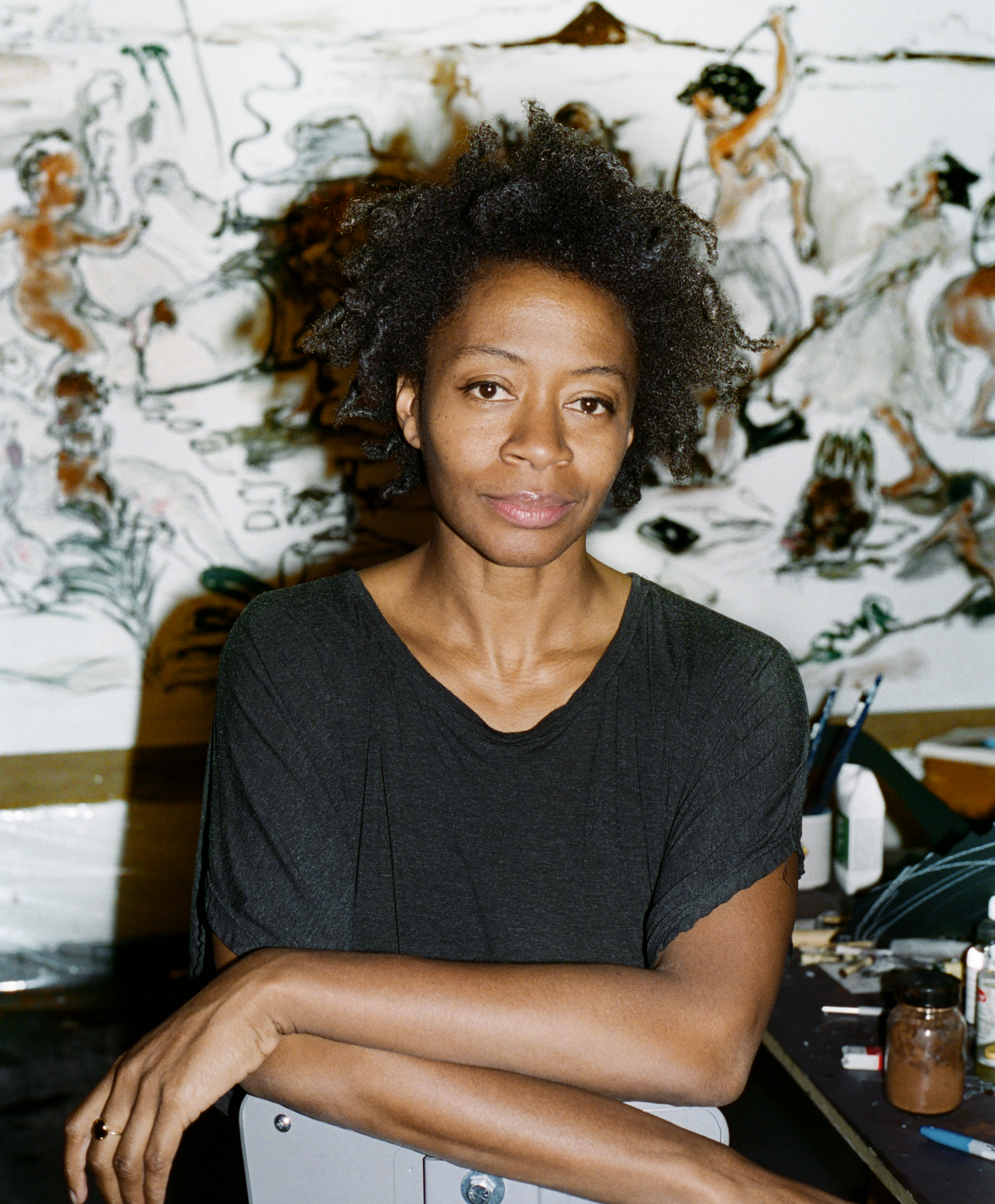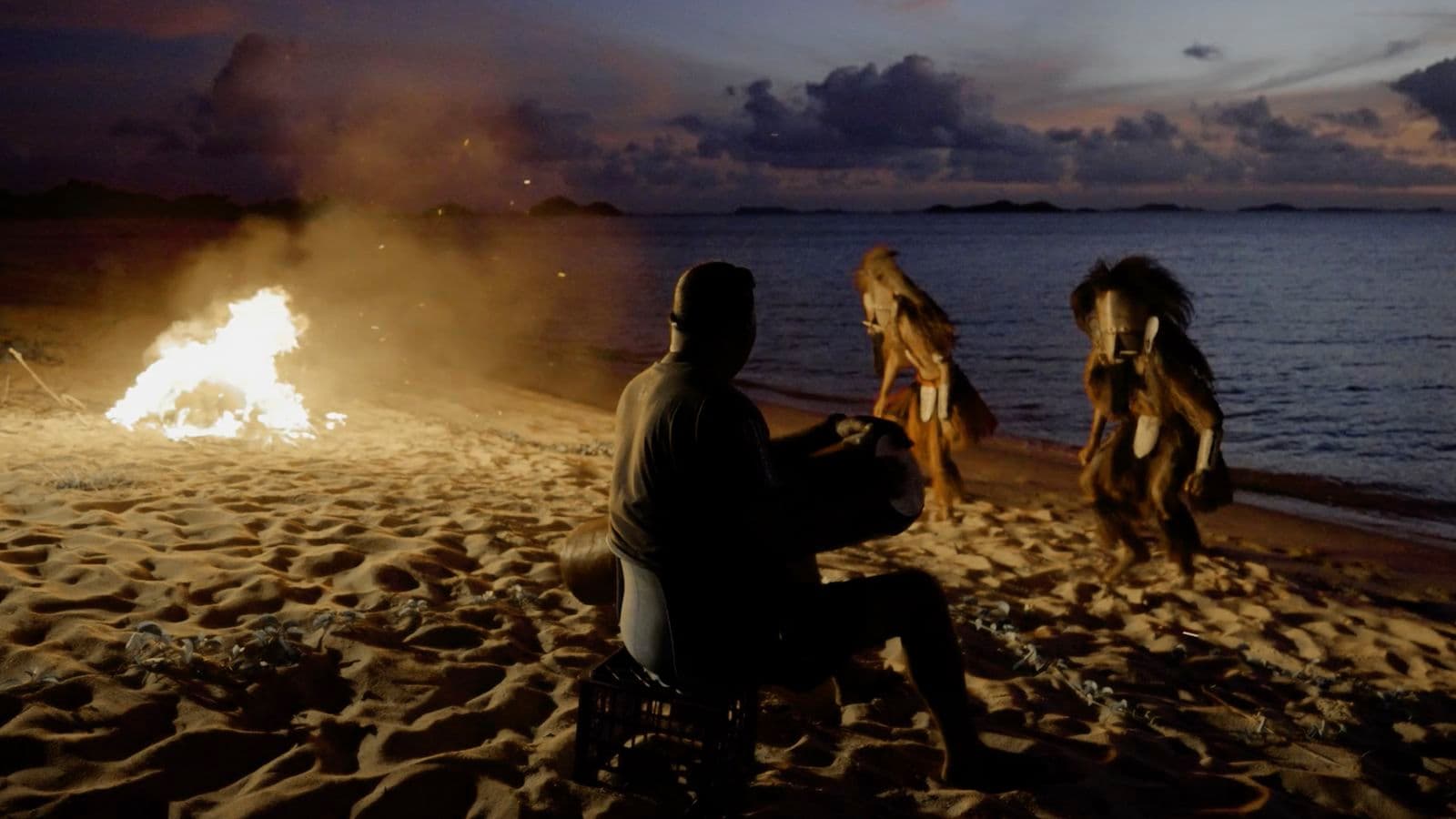Your World is About to Change

Kara Walker, image courtesy and © the artist and Sikkema Jenkins & Co., New York, photograph: Ari Marcopoulos
The National Gallery includes two major acquisitions in a monographic exhibition of the North American artist KARA WALKER, the first to be held in Australia. PRECIOUS ADESINA explores the artist’s searing narratives of race, gender, and sexuality.
In 2004, the renowned American artist Kara Walker made her first film. She transformed her signature black‑paper silhouettes into shadow puppets to create the almost‑nine‑minutes‑long, black‑and‑white animation Testimony: Narrative of a Negress Burdened By Good Intentions, which depicts the lynching of a white master by his ‘lover’ — an enslaved Black woman. It’s an anecdote of revenge plagued with sex, violence, and gruesome racial stereotypes of the kind with which followers of Walker’s work are familiar.
According to Sally Foster, Senior Curator of Prints and Drawings at the National Gallery, Walker’s animation uses performance and text to tell a story ‘reminiscent of a slave testimony or folktale’. In some of these accounts, white male owners sleep with Black women, who refuse to return to the pecking order after these sexual encounters and murder them. ‘The short film, which begins with an image of blackness — an extreme close‑up of the Black female character — depicts images of the enslavement, rape, and degradation of both Black and white characters before concluding with the anti‑heroine of the story performing fellatio on the dead body of her lynched lover and being subsumed (along with the screen) by his viscous white semen,’ Foster says.

Kara Walker, Testimony: Narrative of a Negress Burdened by Good Intentions (still), 2004, National Gallery of Australia, Kamberri/Canberra, purchased 2021, © Kara Walker
Now 52, Walker has been in the limelight for such work since her twenties, after her New York debut at the Drawing Center in 1994, where she showed Gone: An Historical Romance of a Civil War as it Occurred between the Dusky Thighs of One Young Negress and Her Heart. This large wall installation comprises her now‑standard paper cut‑outs to create imagery that, at first glance, appears innocent but, in fact, portrays a child engaging in sexual acts, a standing woman giving birth to babies who topple headfirst onto the ground, and a person with a swollen penis. ‘Looking like a cross between a children’s book and a sexually explicit cartoon, this is skilful, imaginative work and will doubtless be showing up elsewhere soon,’ observed Holland Cotter in his review of the show for the New York Times.
Walker’s work stood out then, as it does today, because she often adopts imagery used for the Black community by white people that, in most contexts, would be considered offensive. ‘Stereotypes are insidious and dangerous because they can be so easily internalised, and some whites and Blacks have done so. One of Kara’s goals is to underscore this problem,’ says art historian Robert Hobbs, whose book Kara Walker: white shadows in Blackface was published in September. ‘Her racist stereotypes are projections that very sophisticated Blacks have embraced not because they like or prefer them but because they point to the absurdity and even the insanity of stereotypes.’
Walker’s video work takes her style and her intentions one step further by involving viewers in the process and by having a ‘more overt engagement with narrative’, says Rebecca Peabody, Head of Research Projects and Programs at the Getty Research Institute in Los Angeles, explaining that Walker deliberately allowed for ‘the mechanics of the work’s creation’ to be apparent in her films. ‘The articulated paper puppets lurch awkwardly in their actions while, at times, the apparatus that supports the animation — the puppets’ rods and strings, the occasional human hand or puppeteer’s face — are visible throughout,’ adds Foster.

Kara Walker, no world (detail) from the series An Unpeopled Land in Uncharted Waters, 2010, courtesy of the artist and Sikkema Jenkins & Co., New York © Kara Walker
Testimony is one of two artworks by Walker recently acquired by the National Gallery and shown in the Gallery’s latest exhibition, Project 2: Kara Walker, the artist’s first solo show in Australia. The second piece is the 2019 drawing quadriptych, Your World is About to Change. ‘To the left, a woman bearing the inscription “10% free” raises her arms in rapture over a floral paradise or homeland,’ says Foster, noting that the two pieces the Gallery now owns represent Walker’s oeuvre over the past two decades. ‘On the far‑right, a kneeling female figure, weighted down by the anchor of the slave ship that has transported her across the Atlantic, prays for emancipation. Above her, floating spirits offer wry reassurances that “your world is about to change” and “everything will turn out fine this time”.’
Foster points out that the kneeling figure in Your World Is About to Change is based on a medallion from 1787 by British potter and abolitionist Joshua Wedgwood. ‘In Walker’s narrative, her subjects find themselves the unwitting protagonists of the Atlantic slave trade that operated between Britain, West Africa and America from the sixteenth until the nineteenth century,’ she says. ‘Wedgwood’s original image, which showed a muscular young Black man kneeling and in chains, was designed to promote the British abolitionist movement’s cause and proved instrumental in ending slavery in both Britain and the United States.’ At the top of the black‑and‑white medallion, the phrase ‘Am I Not a Man and a Brother?’ is inscribed — a slogan many white abolitionists adopted to show solidarity against slavery in the eighteenth century.
Beyond the Gallery’s two new acquisitions, Project 2 is enhanced by pieces from the artist’s own collection. This includes a maquette of Fons Americanus, a fountain created for the Turbine Hall commission at Tate Modern in 2019. ‘Your World is About to Change is a charcoal, graphite, and acrylic paintwork on paper from Walker’s Fons Americanus archives,’ says Foster. The Tate piece references Thomas Brock’s 1911 Victoria Memorial, a statue of a gilded winged Victory standing on a globe near Buckingham Palace in London dedicated to Queen Victoria, who had then reigned longer than any previous British monarch.

Kara Walker, Your World is About to Change (installation view), 2019, National Gallery of Australia, Kamberri/Canberra, purchased with the assistance of the Poynton Bequest in celebration of the National Gallery of Australia's 40th anniversary, 2022 © Kara Walker
Directly questioning the honouring of monuments — especially those associated with colonial narratives — Walker adopts a traditional format to explore historical violence against Black people. ‘Fons Americanus turns the celebration and honouring of monuments inside out,’ the Tate published at the time. ‘It is significant in the wake of recent student demonstrations to take down monuments that celebrate colonial histories in both the US and UK.' A year later, many statues were further called into question across the globe after the murder of George Floyd by a white officer in Minneapolis saw worldwide protests against police brutality and discrimination.
Walker’s work, alongside these protests, shows that her art, despite its apparent relationship with Black American racial history, can be used as a conduit to examine communities beyond America alone. 'The most interesting and, I think, productive receptions of Walker’s art in international contexts are those in which her work opens up conversations about local histories of enslavement and oppression,' says Peabody.

Kara Walker, Fons Americanus (installation view), 2019, courtesy of the artist and Sikkema Jenkins & Co., New York © Kara Walker
Yet, Walker’s work has not been without controversy. Most notably, in the 1999 PBS series I’ll Make Me a World, the artist Betye Saar dubbed it ‘revolting and negative and a form of betrayal to the slaves’, following a boycott of Walker’s work she had started with artist Howardena Pindell in 1997. In 1999, Walker’s artwork A Means to an End: A Shadow Drama in Five Acts, made in 1995, was removed from an exhibition at the Detroit Institute of Art in 1999 after protests by artists and collectors.
But the idea that all Black artists need to agree leaves little room for discussion of the varied and multifaceted Black experience. Whether you approve of Walker’s art or not, it has certainly provoked many meaningful discussions about the representation and experience of Black people across the world.

